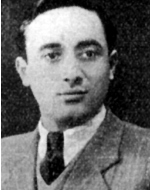Abraham, the only son of Leah and Eliezer, was born on October 5, 1925 in Poland, in the town of Wolbrom in Kielce. At the age of two, the family moved to Bedzin, also in the same district, where Avraham studied and was educated. He was a good, quiet child, a child of indulgence whose parents had lavished warmth and love upon him. When he was six years old, he began studying in the “cheder” and was discovered to be a diligent student. He continued his studies in elementary school and began to study notebooks, but at the age of 14 World War II broke out and his studies were interrupted. On the eve of the Nazi invasion, 27,000 Jews lived in Bedzin. The Germans entered the city on September 4, 1939, and immediately began a series of acts of abuse and murder against the Jewish inhabitants of the city. Bedzin was located in the eastern Upper Silesia region, a region rich in coal reserves where the heavy industry of occupied Poland lay. The Germans, who needed working hands, rejected the deportations of the Jews of the area to the death camps, and the Jews of Bedzin were exploited as part of the SS labor camps. And industry in workshops (“shofim”) established in the city. Many of the young men were sent to forced labor camps throughout the Reich. In the years to come, the Jews of the city were sent to extermination camps, where most perished. By 1941, Avraham’s family had managed to remain united in the city where she lived, but then the package was separated. Abraham was taken away from his parents and sent by truck to somewhere. At first he received news from them, but later learned that they had been executed in the gas chambers. He was 16 when he began to wander around the Reich, orphaned and lonely, being led from one concentration camp to another. He worked in forced labor, suffering from cold, hunger and sickness, and finally reached the worst place of all – Auschwitz. With great difficulty he managed to survive the inferno under constant threat of death, and for many days existed only from a thin soup made of rotten bark. In Auschwitz he was employed in hard labor of stone clearance near the railway station, when he was forced to watch the shipments of the man led to the fire. Miraculously he was saved from there, and then transferred to another camp near Buchenwald. When news reached of the Russians’ approach to Germany, the Nazis began a hasty retreat. The prisoners, most of them Jews, were marched in long columns on a grueling trek through the bitter cold, in snow-covered forests, in the so-called “death march”. The journey lasted about six weeks without rest, sleep and food. On their way, a storeroom with wheat grains came upon them. The crowd of people fell on the sacks of reality, and in the midst of the commotion, there were also casualties. Avraham, whose bare foot froze, wished to die, but his friends supported him, encouraged him, and encouraged him to continue. He held out until he was brought to the hospital, and so he survived. At the end of the war, after recovering a little and returning to his forces, Avraham was one of 15 young men and women who founded the first training group that was established in Germany after the Holocaust – “Kibbutz Buchenwald.” The idea of establishing a training kibbutz was born during the war with a group of camp inmates, religious and secular Jews from Germany and Poland, most of them with pioneering backgrounds or Zionist tendencies. They began their training on a German farm in the Weimar region and then moved westward to Bavaria, where they worked for three years. The members of the group boarded the “Natan Alef” ship, which was organized by the Mossad Le’Aliyah Bet of the Haganah and left the port of Bari, Italy, on August 27, 1945, with 73 immigrants on board, members of Zionist pioneering movements. On September 8, 1945, the ship reached the coast of Caesarea, and before the British succeeded in locating it, the immigrants were removed and dispersed throughout the country. Upon arrival in Israel, members of Kibbutz Buchenwald joined Kibbutz Afikim in the Jordan Valley, where they stayed for two years. Avraham became a member of the kibbutz, adapted to the new conditions, and soon became friends and acquaintances. In March 1948, when the enlistment order was issued, Avraham joined the Palmach’s ” And was stationed in the Second Battalion (the Northern Negev), whose fighters dispersed in the besieged Negev settlements. At the beginning of the war he was sent to Barot Yitzhak, a religious kibbutz in the northern Negev, where he underwent training and training. Thanks to his excellence, he was sent with his platoon to help Kfar Darom and took on the most dangerous roles. Kfar Darom, a Jewish settlement near Gaza, was among the eleven Hebrew points that came to settle on the eve of Yom Kippur (October 1946.) Because of its strategic location on the coastal road, it was the first Jewish settlement to be attacked, even before the end of the British Mandate. On May 11, 1948, Kfar Darom was attacked by units of the Muslim Brotherhood operating under the regular Egyptian military command. In his fierce attack, the enemy was assisted by an armored vehicle, and the heavy bombardment of the settlement destroyed its houses and fortifications. Avraham and several of his friends fell when a shell hit the roof of their position, and they suffocated under the rubble. Twenty-two years old. Avraham was buried the day after he fell in Kfar Darom. After a while he was put to rest in the Nahalat Yitzhak Military Cemetery.
